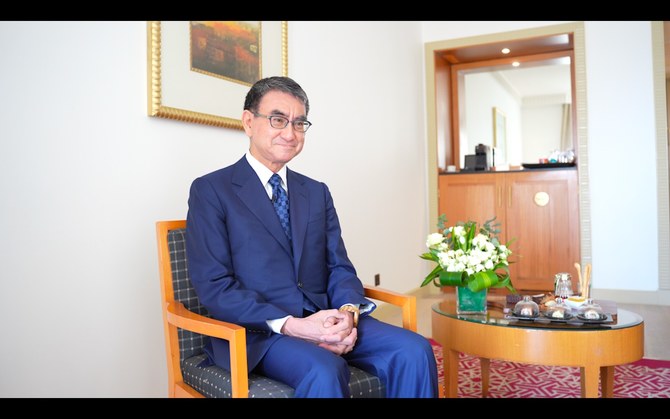
- ARAB NEWS
- 02 Jul 2025

JEDDAH: Lauding Saudi Arabia’s efforts in developing giga-projects and the ongoing digital transformation in the country, a top Japanese official expressed his country’s willingness to strengthen collaboration with the Kingdom in the field of information technology.
Speaking to Arab News, Japanese Minister for Digital Transformation Taro Kono described his recent visit to one of the crown jewels of Vision 2030, NEOM, as truly remarkable.
The minister said that “he had the opportunity to fly over the project and witnessing it firsthand was truly remarkable.”
Since the launch of Vision 2030, Saudi Arabia has been in overdrive to diversify its economy away from oil and emerge as a hub of tourism, entertainment, technology, and renewable energy. On its road to transformation, the Kingdom is forging strategic partnerships with its global allies to achieve its target and work on mutually beneficial arrangements.
“I heard a lot about NEOM and The Line, I saw that the progress made was very impressive. And we heard the vision from the CEO. And it’s very convincing. So I was very glad that I came to NEOM this time. It was a very short (trip), but I think it was worth it,” the minister told Arab News.
NEOM, often referred to as the “city of the future,” is a $500-billion megacity project situated in the northwest region of Saudi Arabia. Encompassing 26,500 sq. km, the project aims to become a global leader in technology, innovation, and tourism through futuristic urban design and sustainable energy solutions.
Talking about Saudi Arabia’s demography, the minister said it is “a very young country” where the majority of the people are under the ages of 30-35. “And I see the Kingdom becoming more vibrant. And projects like NEOM” show that the country is swiftly moving forward.
Acknowledging the Kingdom’s success in adapting to the latest technologies, particularly related to cybersecurity, Kono praised the country’s leadership and its vision. He expressed his eagerness to forge a partnership with his Saudi counterpart to “learn from the Kingdom’s success.”
“I think the Kingdom is building up its resilience against any malicious attacks in cyberspace. So, I believe it is very ready to take a bold step forward. And I had a meeting with Saudi Minister of Communications and Information Technology Abdullah Al-Swaha and I think there’s a lot to learn from the Kingdom,” the Japanese minister said, adding that he had instructed his team to get in touch with their Saudi counterparts to learn from their approach.
Kono, however, stressed the need to develop non-English datasets to train artificial intelligence and proposed collaboration between Japan and Saudi Arabia in this regard.
While Japan has historically led in hardware technology, the minister admitted a lag in digital technology investment. Recognizing this gap, he signed a memorandum of cooperation with Al-Swaha to learn from Saudi Arabia’s IT advancements.
He said that although Japan excelled in analog technology during the 20th century, admittedly, they have fallen behind in investing in digital technology.
Their discussions reportedly included topics such as E-ID utilization, where Kono hopes to collaborate on developing mutual use cases to propel Japanese progress. He added: “I think the Kingdom and Japan could work together to advance in the field of IT software AI, so very much looking forward to that.”
With shared visions such as Vision 2030 and upcoming events like Expo 2025 in Osaka and Expo 2030 in Riyadh, the two countries have maintained a strong relationship for nearly seven decades.
Kono believes there is immense potential for collaboration between the two countries, particularly in joint projects for Expo 2025 in Osaka and Expo 2030 in Riyadh. “I am looking forward to continue working closely with the Kingdom,” he added.
Expo 2025 is scheduled to be held in Osaka, Japan. It will be held for 184 days This will be the third time for the Japanese city to host the event. Earlier Osaka hosted the global event in 1970 and then in 1990.
The theme for Expo 2025 is “Designing Future Society for Our Lives,” focusing on creating a better future through innovation and sustainability. The expo will provide a platform for countries to share their ideas and solutions to global challenges.
Expo 2030 is scheduled to be held in Riyadh. As the first World Expo to be hosted in the Middle East, it presents an opportunity for the region to showcase its cultural heritage, technological advancements, and vision for the future. The theme for Expo 2030 in Riyadh is “The Era of Change: Together for a Foresighted Tomorrow.” It is expected to align with Saudi Arabia’s Vision 2030 goals of diversifying the economy and promoting innovation.
Kono said: “When we had our expo in Osaka for the first time, I was probably seven or eight years old. But it gave us sort of a good, big push for the economy, or not just the economy, for society as well. Expo brings in a lot of our dreams, and dreams we had back then come true. So, this Expo 2025 will hopefully bring in another dream. And I hope it will make a bridge to 2030 and we (Saudi Arabia and Japan) can work together to make our dreams come true.”